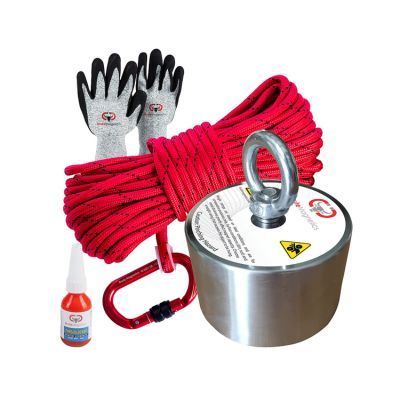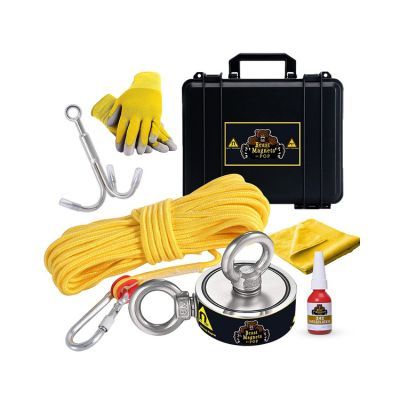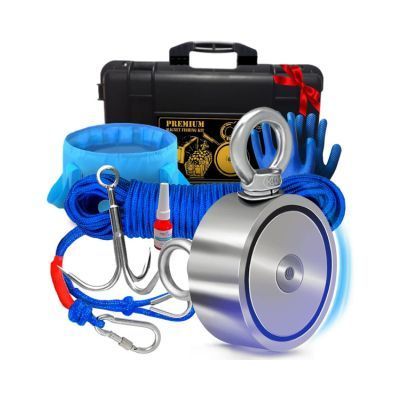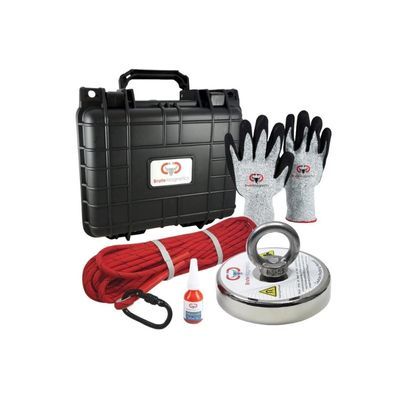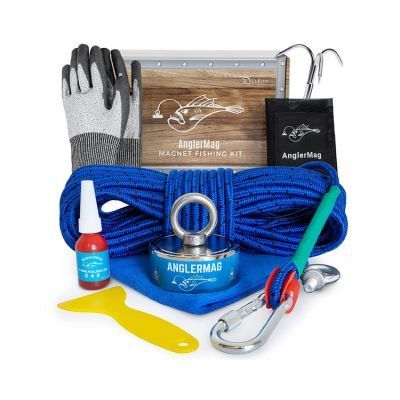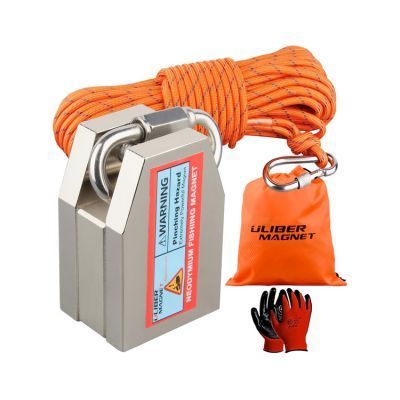Discover the Thrill of Magnet Fishing
Your Ultimate Resource for Tips, Gear, and Legal Guidelines
Welcome to Magnet Fishing Is Fun, where we’re all about the thrill of dropping a strong magnet into the water and pulling up amazing hidden treasures. Whether you’re a total beginner or a seasoned pro, magnet fishing is an awesome hobby that combines adventure, mystery, and even a little bit of history. You never know what’s lurking beneath the surface—bikes, safes, old tools, and sometimes even things you wouldn't believe!
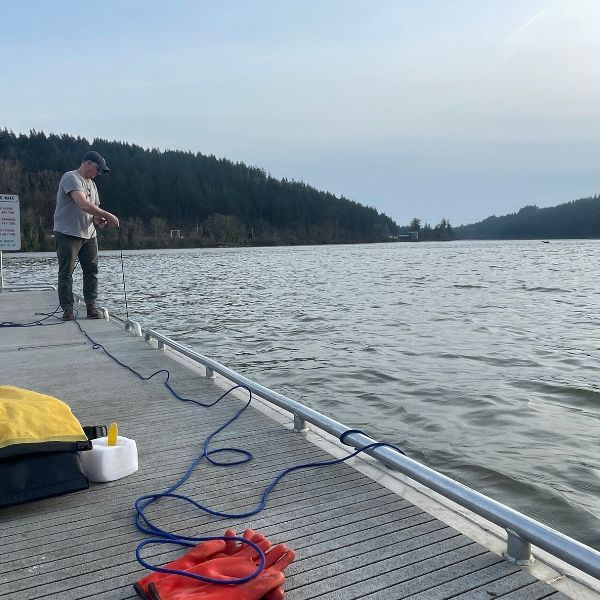
Ever wanted to go treasure hunting without needing a metal detector? That’s exactly what magnet fishing is all about! It’s an exciting hobby where you toss a strong magnet into lakes, rivers, canals, or ponds to pull up hidden metal treasures. From old coins and tools to bikes, safes, and even historical relics, you never know what you’ll find! Plus, it’s a great way to clean up local waterways and help the environment.
What is Magnet Fishing?
Magnet fishing is a hobby that involves using a strong magnet on a rope to retrieve metal objects from bodies of water. The concept is similar to metal detecting, but instead of scanning the ground, you're exploring what's hidden beneath the surface of the water.
Magnet fishing enthusiasts love the thrill of finding unexpected items, as well as the satisfaction of cleaning up the environment by removing metal debris. It's a fun and unique way to explore bodies of water, and it's a great activity for individuals, families, or groups of friends.
The Fundamentals of Magnet Fishing
Magnet fishing is a fun outdoor activity that involves finding ferromagnetic materials in bodies of water using a powerful neodymium magnet attached to a durable rope. Unlike traditional fishing, where the goal is to catch fish, magnet fishing enthusiasts seek discarded or lost items like bicycles, coins, car tire rims, guns, bombs and other metallic objects in the waterways.
One of the key aspects of beginning your magnet fishing journey is understanding the importance of selecting the right size and strength of magnets based on your experience level.
- As per community surveys, it was found that over the last 6 years, the popularity of magnet fishing has grown by an estimated 95%, making it among the fastest growing hobbies.
- Neodymium magnets used in magnet fishing have pulling strengths ranging from 200 lbs to 1,000 pounds or more despite their small size—an impressive scientific feat.
- An informal study conducted among American magnet fishers reported that about 70% of magnet fishers have discovered at least one valuable or historically significant item during their hobby.
Selecting the Right Magnet
When it comes to selecting the right magnet, there isn’t a 'one size fits all' approach. Magnets come in different shapes and sizes with varying degrees of strength. It can be overwhelming for novice magnet fishers to determine which type they need to maximize their efforts.
For example, if you’re starting out as a beginner and want something more manageable, a 170-200 lbs pull force magnet would be ideal. They're typically small enough to carry around easily but still strong enough to retrieve lighter debris like bolts and screws from the waterways.
As you gain more experience of how magnet fishing works, you can purchase stronger magnets that have higher pull force ratings. These types of magnets have greater pulling capacity - ranging from 550lbs all the way up to an ultra-strong 1,200-1,300 lbs pull force - making them able to retrieve heavier items like motors and even safe from deeper waters.
It's important not to purchase magnets too powerful for your abilities as it could result in serious injury or damage to property – which could ruin the enjoyment of this hobby altogether.
With some knowledge about selecting the right size magnet that suits your skills, let's now understand what other necessary gear are required in getting started with magnet fishing. Check out our guide on the best magnet fishing kits for all levels of experience.
When it comes to magnet fishing, it is crucial to select the right magnet for your needs. There is no one-size-fits-all approach, as magnets come in various shapes and sizes with different levels of strength. As a beginner, it is recommended to start with a 170-200 lbs pull force magnet. These are manageable and still strong enough to retrieve lighter debris. As you gain more experience, you can upgrade to stronger magnets with higher pull force ratings, ranging from 500 lbs up to ultra-strong magnets with 1,200-1,300lbs pull force. However, it's important not to exceed your abilities and purchase magnets that are too powerful, as it could lead to injury or property damage. By selecting the right size magnet that suits your skill level, you can enjoy the hobby of magnet fishing safely and effectively.
-
Brute Magnetics Boss Magnet
Read Review -
Beast Magnets 3,200lbs
Read Review -
Logui Projects 1,200lbs
Read Review -
Brute Box 1,000 lbs
Read Review -
AnglerMag 1,250lbs
Read Review -
ULIBER Swivel Magnet Fishing Kit
Read Review
| Equipment | Description |
|---|---|
| Neodymium magnet | Powerful enough to attract heavy metal objects submerged underwater |
| Durable rope | Braided or nylon ropes are ideal for support when pulling heavier items from the water |
| Magnet cover/cone | Prevents snagging by redirecting pulling force towards magnetized base |
| Gloves | Protect your hands while pulling up sharp or rusty metal objects |
| Bucket or Bag | To collect any items you find magnet fishing |
Necessary Gear for Magnet Fishing
If you're considering trying out magnet fishing, there's some necessary gear that you’ll need to get started. An extremely powerful neodymium magnet is the most crucial piece of equipment as it can effectively attract iron and steel items even in murky waters. A durable braided rope is also crucial, primarily if you are fishing in deeper waters, as it won't easily snap or tangle. Additionally, gloves will come in handy when you start to pull heavy items from the water.
Imagine heading to your favorite body of water with a strong neodymium magnet only to realize that you forgot a strong rope at home; the frustration would be palpable!
Another handy accessory for magnet fishers is a cone-shaped magnet cover. It helps prevent snagging during retrieval by concentrating the magnetic force on its flat surface instead of the edges.
Here's a table summarizing the necessary gear for magnet fishing:
With our gear now sorted, let us next look at potential safety precautions and pitfalls we need to consider.
Safety Precautions and Potential Pitfalls
As with every outdoor activity, safety is a significant consideration when it comes to magnet fishing. There are potential pitfalls that one should stay alert for before engaging in this hobby.
For starters, never attempt to retrieve dangerous items that could cause harm unless you’re adequately trained and have proper protective equipment such as gloves and protective clothing. Explosive devices, knives, sharp metal edges, glass items, and ammunition are just a few examples of things to avoid.
Imagine retrieving an old rusty gun from the bottom of a river without realizing that it's loaded; the potential danger is immeasurable.
Moreover, be sure to stay clear of private property that could lead to trespassing charges. Be aware of potential restrictions in your location; some areas may have bans on magnet fishing or require permits.
Another hazard associated with magnet fishing is the unintended impact on other wildlife living in the body of water. Accidentally removing submerged habitats or debris can disturb the environment and pose risks to aquatic life.
Overall, safety first! It’s important never to underestimate potential hazards while exploring fantastic waterways for hidden treasures.
Potential Harms and How to Handle Them
While magnet fishing is an enjoyable and potentially rewarding activity, it is essential to remain aware of the potential risks associated with it. For instance, while searching for lost treasures, you may inadvertently retrieve dangerous or hazardous items such as bombs, rockets, or sharp pieces of metal that pose a threat to your safety. In addition, neodymium magnets used in this activity can interfere with pacemakers and damage electronic devices. As a general rule, it's best to exercise extreme caution when magnet fishing. Always wear protective gloves and handle any detected objects with great care. When you're unsure about an object's identity or safety, avoid touching it directly and call local authorities immediately.
Tips for a Successful Magnet Fishing Trip
Magnet fishing is more than just tossing a magnet into the water; it requires strategic planning and preparation to ensure a successful and safe trip. Here are some tips that will help you achieve both:
Think of it like going on a hike, you don't want to be stranded without the right gear or direction.
- Research your target area: Before embarking on your magnet fishing expedition, conduct thorough research on your target area. Look for areas with easy access points, low currents, and high visibility conditions.
- Come equipped: Magnet fishing requires specific equipment such as gloves, durable ropes with high tensile strength, grappling hooks, and most importantly- a strong Neodymium magnet tailored to suit your preference. Some magnets are suitable for shallow waters, while others work better in deeper water bodies - research well and determine which one suits your needs.
- Dress appropriately: You’ll likely get wet, so choose clothes that dry quickly. Footwear should have good grip.
- Avoid trespassing: Ensure you have permission before attempting to fish in prohibited areas to avoid legal ramifications.
- Be mindful of ecological concerns: Although it is a fun and potentially profitable activity, magnet fishing can cause harm to aquatic life. Avoid causing environmental damage by ensuring that no objects retrieved will be left on the banks.
- Practice safe handling: Handle all detected objects with care, use gloves if possible, and avoid coming into direct contact with sharp or hazardous items.
- Leave the area clean: It's your responsibility to leave the riverbank cleaner than you found it. Dispose of any garbage you brought and take back any debris that doesn't belong there
These tips are just the tip of the iceberg - there's so much more to learn. With dedication, practice and perseverance, you'll become a seasoned magnet fisher in no time.

Responsible Disposal of Found Objects
As a magnet fishing enthusiast, it's crucial to keep in mind that sometimes, unexpected and possibly dangerous objects may turn up. Loaded guns, explosive devices or sharp pieces of metal are just some of the examples you might encounter whilst exploring the depths of waterways. It's essential to handle these findings with the utmost care and attention.
Suppose you discover an object with suspected live ammunition still loaded. In that case, you should immediately contact local authorities such as bomb squads or police departments specialized in handling explosives. Alternatively, suppose items discovered fall under environmental hazards – chemical drums leaking corrosive liquids, for instance. In that case, calling relevant environmental services would be the next source of action.
While disposing of hazardous items discovered by magnet fishing is essential, the same goes for nonhazardous finds as well. If you come across things like bicycles or jewelry that look valuable, it's important not to assume they belong to nobody. A good citizen would take steps to return any lost property or unclaimed goods found.
Two primary options exist for responsible disposal: safely dispose of dangerous items by contacting authorities or simply discard clean trash responsibly in specified areas. The following table briefly highlights appropriate methods for waste disposal.
It's also important not to leave any debris or significant items behind after completing your magnet fishing activity. Leaving large pieces of metal, broken bikes or any other object remnants can be harmful to the surrounding environment and wildlife.
Magnet fishing should always be done responsibly and with attention to environmental impact. That means safe disposal of hazardous materials, ethical handling and government compliance with found items, as well as ensuring that no waste is left behind; by staying mindful of these points, you can help protect the waterways whilst also enjoying your treasure hunting hobby.
Cleaning and Maintaining Your Magnet
Cleaning a magnet used in magnet fishing is essential to maintain its strength and longevity. Here's a proper method for cleaning your magnet.
- Rinse with Fresh Water: Immediately after your magnet fishing trip, rinse the magnet thoroughly with fresh water. This step helps to remove any salt, mud, or debris that may have attached to the magnet during fishing.
- Use Mild Soap if Needed: If the magnet is particularly dirty, you can use a mild detergent or soap. Apply the soap gently with a soft cloth or sponge, and then rinse thoroughly with fresh water.
- Scrub Off Stubborn Residue: For stubborn residue or rust, use a soft brush, like a toothbrush, to gently scrub the surface of the magnet. Be cautious not to scratch the magnet's surface as scratches can lead to rust and corrosion.
- Dry Completely: After cleaning, it's crucial to dry the magnet completely. Use a clean, dry cloth to wipe off any excess water. You can leave the magnet in a well-ventilated area to air dry completely. Avoid leaving the magnet in direct sunlight for extended periods, as this can weaken its magnetic properties.
- Inspect for Damage: While cleaning, inspect your magnet for any signs of damage, such as chips or cracks. Damage can affect the magnet’s performance and safety.
- Apply a Protective Coating: To prevent rust and corrosion, consider applying a light layer of protective coating, such as silicone or rust inhibitor. This is especially important if you often use the magnet in saltwater environments.
- Store Properly: Store your magnet in a dry, cool place. Keep it away from electronic devices and items that can be damaged by a strong magnetic field.
- Regular maintenance not only keeps your magnet clean but also ensures it retains its magnetic strength and is safe to use for your magnet fishing adventures.
Joining Magnet Fishing Communities
Magnet Fishing groups or
communities can provide valuable tips and guidance on where to find the best spots for magnet fishing, as well as sharing stories and experiences with fellow enthusiasts. Remember, magnet fishing is not just a hobby, but also a way to contribute to the preservation and cleanliness of our waterways.
-
What is Magnet Fishing?
Magnet fishing involves using a powerful neodymium magnet attached to a rope to find and retrieve metal objects from water bodies. It's akin to metal detecting but focuses on water sources such as rivers, lakes, and canals.
-
What Equipment is Needed for Magnet Fishing?
The essential equipment includes a high-strength neodymium magnet, a sturdy rope, and gloves for safety. Some enthusiasts also use grappling hooks to aid in retrieving larger items, and a bucket or container to hold the finds.
-
Is Magnet Fishing Legal?
The legality of magnet fishing varies by location. In the United States, it's generally legal but may be restricted in certain areas due to environmental or safety concerns. It's important to check local laws and regulations before starting.
-
What Can You Find Magnet Fishing?
Finds range from mundane objects like bottle caps and nails to more exciting items like bicycles, safes, tools, historical artifacts, and occasionally weapons. The variety of finds is one of the aspects that makes magnet fishing intriguing.
-
What are the Safety Considerations in Magnet Fishing?
Safety is a key concern. It includes using gloves to protect from sharp objects, being aware of water currents and depth, and taking care not to retrieve potentially dangerous items like unexploded ordnance. It's also important to respect the environment and dispose of finds responsibly.
Join Our Mailing List
Thank you for joining our Magnet Fishing community mailing list! We're excited to have you on board and look forward to sharing our passion for magnet fishing with you.
Find a great spot to magnet fish near you, some of our gear reviews, or intersting stories about magnet fishing in our blog.
Oops, there was an error sending your message.
Please try again.
| Object Category | Disposal Method | Notes |
|---|---|---|
| Hazardous | Contact relevant authorities | Call specialized units to remove objects from the area |
| Valuable and/or Identity-driven | Turn in to local authority | Check the region's regulation on lost and found property |
| Recyclable | Sort and dispose in recycling collection | Check your local recycling guidelines |
| General waste | Dispose of in municipal solid waste collection province | Different regions usually employ varied regulations. |


